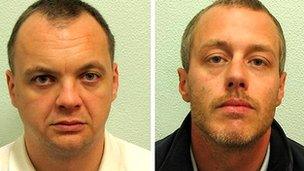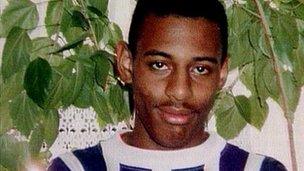Stephen Lawrence murder: Gary Dobson drops appeal
- Published

Gary Dobson and David Norris were jailed for life
One of the two men jailed for life for the racist murder of black teenager Stephen Lawrence has dropped his appeal against the conviction.
Gary Dobson, 37, was jailed for life in January 2012 for murdering the teenager in Eltham, south-east London, in 1993.
The second man, David Norris, 36, is continuing his appeal against the conviction.
There will be a hearing for Norris's case at the Court of Appeal in London, at a date to be set.
Dobson is serving a minimum of 15 years and two months and David Norris 14 years and three months.
Last summer, applications for permission to appeal by both men were rejected by a single judge who considered the papers from the case.
But the pair still had the right to renew their applications before a panel of judges sitting at the Court of Appeal.
A spokeswoman for the Judicial Office confirmed: "Gary Dobson has abandoned his renewed application to appeal his conviction for the murder of Stephen Lawrence.
"David Norris's renewed application seeking permission to appeal his conviction will be heard on a date to be fixed."
'Racial hatred'
Sentencing them, the trial judge, Mr Justice Treacy, had described the crime as a "murder which scarred the conscience of the nation".

Stephen Lawrence was attacked by a group of white youths in south-east London
The judge said the murder of the A-Level student was committed "for no other reason than racial hatred".
The breakthrough in the investigation followed the introduction of a cold case team of forensic scientists.
The men were the first people convicted over the fatal attack on Mr Lawrence by a group of white youths near a bus stop in Eltham, but police inquiries into the killing are continuing.
During their trial, Dobson and Norris denied murdering Mr Lawrence and said their clothing had been contaminated as police mixed up evidence over the years.
Detectives spent months establishing the movements and handling of the exhibits since 1993, and the jury was told that contamination was implausible.
In January it was reported Norris was to appeal on the basis that the use in evidence of a surveillance video was unfair.
- Published22 January 2013
- Published11 January 2013
- Published10 January 2013
- Published29 November 2012